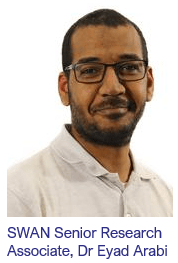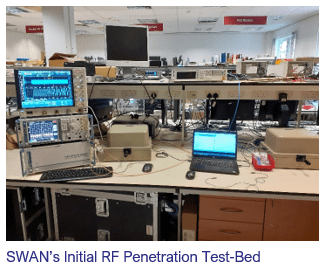This spotlight blog series takes a deeper dive into the recent work of our Post-Doctoral Researchers, our aligned PhD students, and research team members from across the SWAN Prosperity Partnership.
In the next blog in this series, we asked SWAN Senior Research Associate Dr Eyad Arabi a few questions about his work on frequency-agile amplifiers and the SWAN RF penetration test-bed facility.
 What are your main research tasks within SWAN and how do these relate to your previous research experience?
What are your main research tasks within SWAN and how do these relate to your previous research experience?
In the SWAN project, I am implementing an RF penetration testbed. Initially we are investigating the LoRa wireless air-interface, however, other air-interface technologies such as WiFi and LTE will also be considered. This is related to my previous experience of extensive RF test and measurement.
Can you give us a brief overview of the work you have been doing recently and how this relates to the SWAN Prosperity Partnership?
I have been working on the design and testing of RF Power Amplifiers. The emphasis is on frequency-agile amplifiers, which are very relevant to the SWAN project because frequency agility/reconfigurability is key to the implementation of secured-by-design power amplifier systems.
Where does this work fit in with SWAN’s wider Research Challenges?
In the SWAN project we investigate potential attacks on the physical layer of the wireless systems. After these attacks are identified and mitigation techniques are proposed, novel RF circuits/systems are to be developed to enable the concept of secured by design.
What will be the key outputs of this particular piece of work?
This work will result in novel RF design techniques as well as novel circuits and systems which are designed with the concept of security in mind. With the widespread of wireless technologies, security is being considered as a key requirement. Therefore, the output of this research is timely and has the potential for great impact.
How have SWAN’s Partners in industry and government been involved in this work package?
The SWAN partners have great experience with security aspects and have contributed greatly to this work package.
What are the next steps for this section of research?
The next steps are to develop RF circuits and design techniques and publish the outputs in high impact journals and conferences.
Can you tell us of one recent publication in the world of communications systems and networks research that has interested you?
‘Multifunction, Multiband and Multimode Wireless Receivers’ by Jaber Moghaddasi and Ke Wu, which was published in the Microwave Magazine journal. This paper is very well written and provides a nice review of reconfigurable receivers.
Is there anything else you would like to tell us?
It was interesting to work on a prosperity partnership project. In the SWAN project there is a great involvement from the industrial and government partners, which has been a different and enriching experience.
After six years at the University of Bristol contributing to various projects in the CSN Group and Smart Internet Lab, Eyad will be moving on to take up a new role with CML Microelectronics at the end of May. We wish him the best of luck with the next step in his career.
SWAN Prosperity Partnership
Interested in reading more about SWAN and our programme of research? Take a look at our website for more information or sign up to our newsletter for regular updates on SWAN activities and opportunities to get involved.
